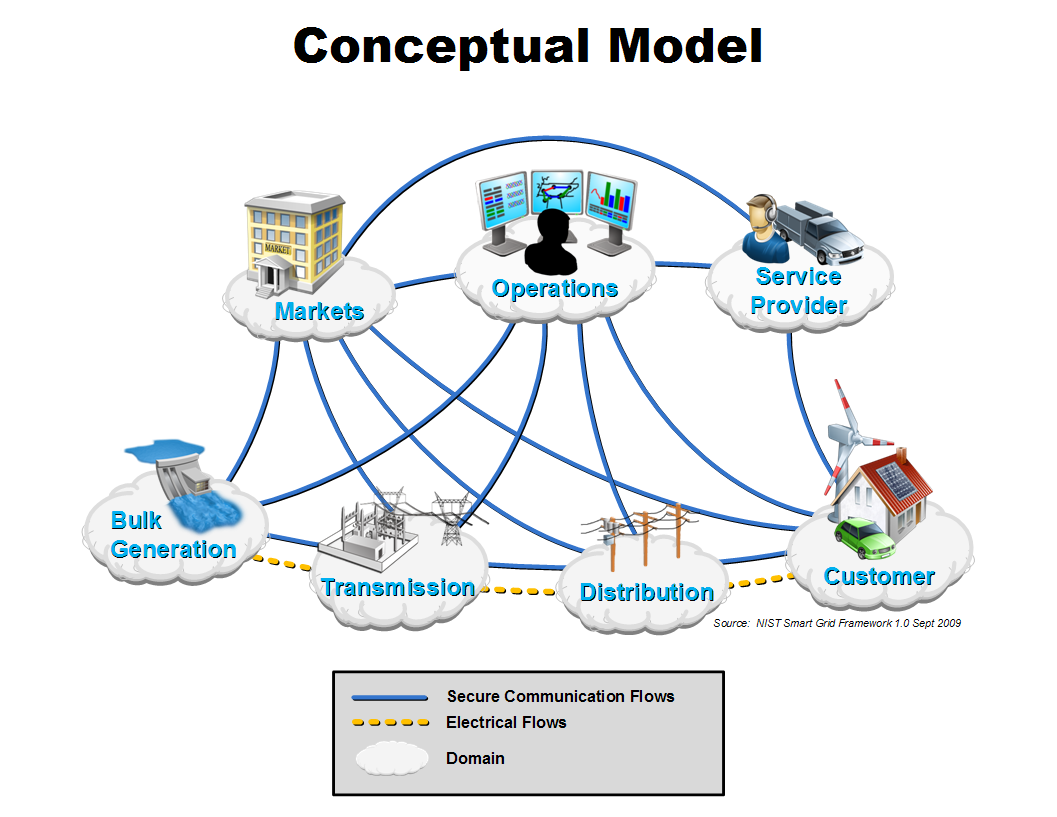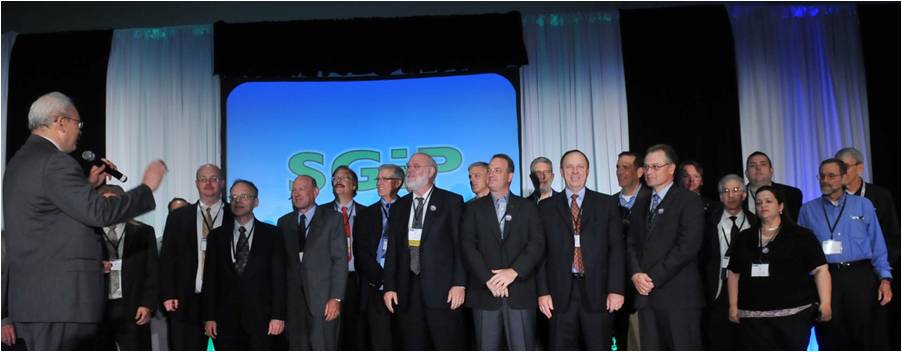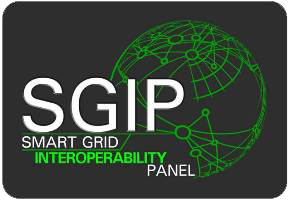Welcome to the NIST Smart Grid Collaboration Wiki | |
| PAGE CONTENTS | |
Under the Energy Independence and Security Act (EISA) of 2007, the National Institute of Standards and Technology (NIST) has "primary responsibility to coordinate development of a framework that includes protocols and model standards for information management to achieve interoperability of smart grid devices and systems..." To carry out its EISA-assigned responsibilities, NIST devised a three-phase plan to rapidly establish an initial set of standards, while providing a robust process for continued development and implementation of standards as needs and opportunities arise and as technology advances. This wiki and the Smart Grid Interoperability Panel (SGIP) were born from that plan. Click here for additional information on NIST's role and activities. | |
What is a “Smart Grid?”
By integrating an end-to-end, advanced communications infrastructure into the electric power system, a Smart Grid can provide consumers near real-time information on their energy use, support pricing that reflects changes in supply and demand, and enable smart appliances and devices to help consumers avoid higher energy bills.
The above figure highlights interactivity of the Domains of the Smart Grid.
A more intelligent grid can also:
- reduce the duration and frequency of power outages
- lower generation requirements by reducing inefficiencies in energy delivery
- facilitate efficient charging of electric vehicles
- better integrate wind and solar resources
- provide more effective management of distributed generation and storage.
What is the Smart Grid Interoperability Panel?
The National Institute of Standards and Technology (NIST) initiated the SGIP to support NIST in fulfilling its responsibility, under the Energy Independence and Security Act of 2007, to coordinate standards development for the Smart Grid. Established in late 2009, the SGIP is a public/private partnership that defines requirements for essential communication protocols and other common specifications and coordinates development of these standards by collaborating organizations. In 2012, the SGIP was comprised of over 780 member organizations representing 22 stakeholder categories, including international organizations, federal agencies as well as state and local regulators. Nearly 2,000 individuals are participating in SGIP activities. In January 2013, SGIP entered a new phase - self-sustaining entity with the majority of funding to come from industry stakeholders. NIST maintains an active role and continues to support SGIP’s mission to provide a framework for coordinating all Smart Grid stakeholders in an effort to accelerate standards harmonization and advance the Interoperability of Smart Grid devices and systems.
In October 2012, the SGIP was recognized by the GridWeek Advisory Board “for significant achievements in Taming Smart Grid Complexity in the pursuit of an interoperable grid.” Twenty-five SGIP participants took the stage to accept the award on behalf of the SGIP. (Photo Credit: GridWeek 2012)
SGIP Technical Activities
Given the complexity and urgency of its mission, the SGIP has several priority-specific committees and working groups. NIST maintains an active presence in these groups. Using the top navigation of this site, you will find further details and current information on these groups. Smart Grid Architecture Committee (SGAC): Maintains a conceptual reference model for the Smart Grid and develops corresponding high-level architectural principles and requirements. Smart Grid Testing and Certification Committee (SGTCC): Creates and maintains the necessary framework for compliance, interoperability and cybersecurity testing and certification for recommended Smart Grid standards. Cyber Security Working Group (CSWG): Identifies and analyzes security requirements and develops a risk mitigation strategy to ensure the security and integrity of the Smart Grid. Priority Action Plans (PAPs): Currently totaling 16, PAPs address specific standards-related gaps and issues for which resolution is most urgently needed. New PAPs are added as necessary. Domain Expert Working Groups (DEWGs): Numbering seven, DEWGs perform analyses and provide expertise in specific application domains. Current DEWGs are:- Transmission and Distribution
- Building to Grid
- Industry to Grid
- Home to Grid
- Business and Policy
- Vehicle to Grid
- Distributed Renewables, Generation, and Storage
The Catalog of Standards
The Catalog is a compendium of standards and practices considered to be relevant for the development and deployment of a robust and interoperable Smart Grid. The Catalog of Standards is anticipated to provide a key but not exclusive source of input to the NIST process for coordinating the development of a framework of protocols and model standards for the Smart Grid under its Energy Independence and Security Act (EISA) of 2007 responsibilities.
Topic revision: r258 - 2013-02-18 - 09:58:09 - JenyDowlin

In January 2013, the Smart Grid Interoperability Panel, established by NIST, fully transitioned to a private/public partnership funded by industry stakeholders in cooperation with the federal government. NIST continues an active role in the SGIP. Current news and member information now resides at SGIP.org.
PLEASE NOTE: This wiki is a collaborative website. NIST does not necessarily endorse the views expressed, or concur with the facts presented on these sites. Further, NIST does not endorse any commercial products that may be mentioned on these sites. All the material on this website is in the public domain, including any text, diagrams, or images, unless indicated explicitly. Don't share anything on this site that you do not want to be public. Do not pass any proprietary documents or put any on the TWiki with implied public disclosure. If you do, it shall be deemed to have been disclosed on a non-confidential basis, without any restrictions on use by anyone, except that no valid copyright or patent right shall be deemed to have been waived by such disclosure. Certain commercial equipment, instruments, materials, systems, software, and trade names may be identified throughout this site in order to specify or identify technologies adequately. Such identification is not intended to imply recommendation or endorsement by NIST, nor is it intended to imply that the systems or products identified are necessarily the best available for the purpose. Any data provided on this site is for illustrative purposes only, and does not imply a validation of results by NIST. By selecting externals links, you will be leaving NIST webspace. Links to other websites are provided because they may have information that would be of interest to you. No inferences should be drawn on account of other sites being referenced, or not, from this page. There may be other websites that are more appropriate for your purpose.
Ideas, requests, problems regarding TWiki? Send feedback
Ideas, requests, problems regarding TWiki? Send feedback


